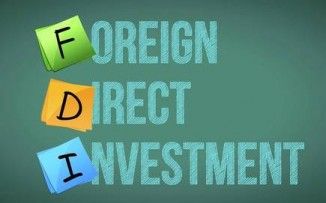FDI is a self-explaining concept. FDI is the one in which investors in a company based in the country from another country (foreign country) invest. Now an individual, business, etc. can be such an investor.
Foreign direct investment (FDI) is termed when a corporation takes over ownership in a business or enterprise situated in another country. It involves international companies directly in everyday operations in other countries. This means that they carry not only capital but experience, skills, and technology also. FDI typically happens when an investor creates or acquires international business practices, including ownership or the management of foreign company interests. FDI in India rose 13% from $44.36 billion a year earlier to a record of $49.97 billion in FY20. In the quarter which ended March 20, FDI influxes amounted to $13.2 billion.
- What is FDI?
- FDI types
- FDI in India
- Routes via which India gets FDI
- Ban on FDIs
What is FDI?
FDI is a self-explaining concept. FDI is the one in which investors in a company based in the country from another country (foreign country) invest. Now an individual, business, etc. can be such an investor.
In general, the buyer acquires the company's properties or develops commercial operations for ownership of the company in a foreign country. It is very different from the acquisition of international company equities, i.e. the investment in portfolios.
FDI Types
There are three primary styles –
- Horizontal
- Vertical
- Conglomerate-of foreign direct investment.
The setting up of the same company in a foreign country will be a horizontal venture.
And a vertical investment is when an existing company in a foreign country is slightly differentiated. So that is where the investment is made even though the organization is not associated with its current sector is termed as Conglomerate.
FDI in India
For a developing country like India, FDI is an important tool for economic development. The liberalization process is thus pursued to increase the flow of foreign investment. But economic liberalization is always controlled.
For the economic development of India, FDI is an important monetary source. Economic liberalization began in India following the 1991 crisis, and FDI has been growing steadily in India since then. India is now a member of the top 100 clubs on Ease of Doing Business (EoDB) and ranks worldwide number 1 in the FDI greenfield.
Routes via which India gets FDI
India gets FDI by two routes -
- Automatic route
- Government route
Automatic route -
Private foreign investors are not required to accept or sanction letters for this category. Without government approval, he can invest in any business he likes.
Sectors falling under the category 'Automatic route' 100%
Food Manufacturing, Gems & Jewellery, Health services, Business, Agriculture, Farms, Animal Facilities, Airports, Property Reconstruction, Auto Parts, Vehicles, Biotechnology, Television Content Services, Chemicals, Carbon & Lignite, Hospital Construction, Credit Data Companies, Duty-Free Shops, Petroleum & Natural gas, Pharmaceuticals, Plantation sector, Ports & Shipping, Railway Infrastructure, Renewable Energy, Roads & Highways, and many others.
Sectors falling under the category of up to 100% 'Automatic route'
- Securities Market Infrastructure Company: 49%
- Insurance companies: up to 49%
- Health equipment: up to 100%
- Pension cost: 49%
- Refining of oil (by PSUs): 49%
- Exchanges of power: 49%
Government route -
There is no investment on this route without the government of India's prior approval. The consent of the government is mandatory. The company must apply for a single-window clearance via the Foreign Investment Facilitation Portal. The proposal will then be transferred to the relevant ministry, which, in consultation with the Ministry of Commerce, the DPIIT, will accept and deny the application. For applications to be handled in compliance with the new FDI Regulation, DPIIT must issue the Standard Operational Procedure (SOP).
Sectors covered by the term 'up to 100% of government route'
- Banking & Public Services: 20%
- Digital Products Broadcasting: 49%
- Core Group Investment: 100%
- Retail of Consumer Products: 100%
- Titanium-bearing stone and ores and mining and minerals: 100%
- Multi-brand retail trade: 51%
- Digital media (publications/specialty magazines/specialty newspapers/periodicals and foreign journalists' fax editions): 100%
- Print Media (publishing news and current affairs journals, newspapers and Indian publishing): 26%
- Satellite (Setup and Operations): 100%
Ban on FDIs
Several sectors are explicitly banned from FDI in every way. Those are sectors -
- Generation of Nuclear Energy
- Any companies that play or gamble or betting business
- Lottery (online, private, public, etc.)
- Chit Funds Investment
- Business of Nidhi
- Planting or agricultural (even if there are many exceptions, such as gardening, fishing, tea plantations, fish farming, animal husbandry, etc.)
- Housing and property (except city, commercial ventures, etc)
- TDR exchange
- Cigars, cigarettes or related tobacco products
In certain sensitive industries like defense, insurance, media, etc, there have always been opposite views on FDI. This is because our democracy is fundamental and because our nation is stable. Therefore, FDI caps exist for each of these industries. In defence, for instance, only 49 percent of FDI is authorized.





